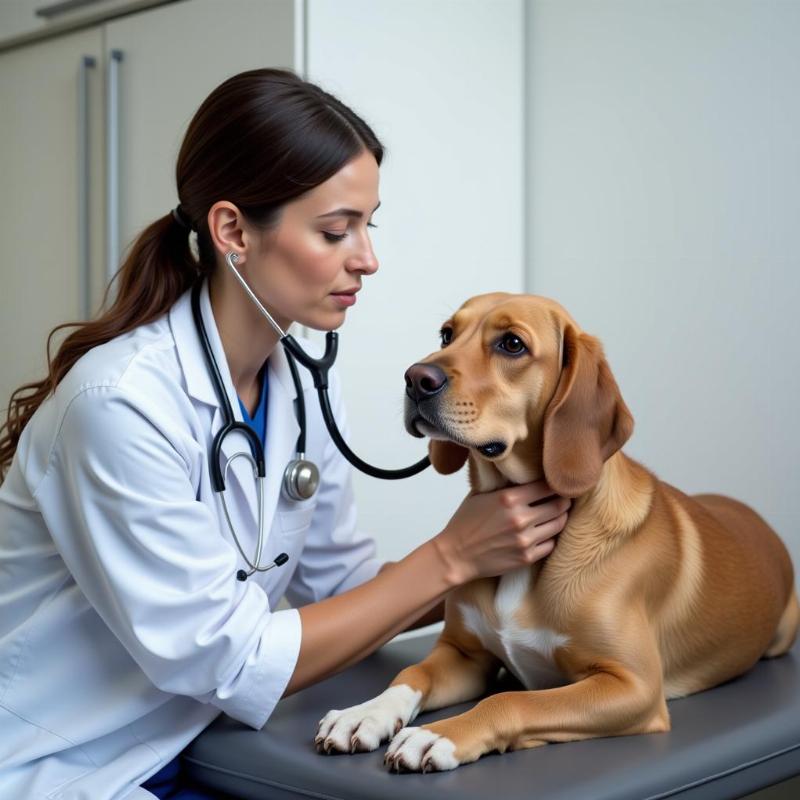When your furry friend is feeling under the weather, it can be a worrying time for any pet owner. “Under the weather ready cal for dogs” might be what you search for when looking for a quick solution, but unfortunately, there’s no magic “ready cal” product specifically designed for dogs. This guide will delve into understanding dog illnesses, providing practical advice on when to seek veterinary care, and outlining steps you can take to help your dog feel better at home, all while adhering to American pet care standards.
Recognizing When Your Dog is Sick
It’s crucial to recognize the signs of illness in your dog. Changes in behavior, appetite, or energy levels can all indicate a problem. Is your usually playful pup suddenly lethargic? Has their appetite decreased or vanished altogether? Are they vomiting, having diarrhea, or showing signs of respiratory distress like coughing or sneezing? These are all red flags that warrant further investigation. Just like with humans, early detection and intervention are key to a quicker recovery.
At-Home Care for Mild Ailments
For minor issues like a mild upset stomach, you can try some at-home remedies. Withholding food for a short period, offering small amounts of bland food like boiled chicken and rice, and ensuring access to fresh water can often help. However, it’s important to note that these remedies are for mild cases. If your dog’s symptoms persist or worsen, you should consult a veterinarian immediately. Never self-medicate your dog with human medications as many are toxic to them.
When to Seek Veterinary Care
Knowing when to take your dog to the vet is crucial. If your dog exhibits severe symptoms like persistent vomiting or diarrhea, difficulty breathing, lethargy, or any sudden changes in behavior, it’s essential to seek professional help. Don’t delay – a quick response can make a significant difference in your dog’s recovery. In addition, regular check-ups and vaccinations are vital for preventative care and can help catch potential health issues early.
does dehydration cause seizures in dogs
Navigating Veterinary Care in the US
Navigating the American veterinary system can be challenging, especially during emergencies. Familiarize yourself with local emergency veterinary clinics and their hours of operation. Keep your veterinarian’s contact information readily accessible. Having a pet first-aid kit on hand can also be helpful in managing minor injuries or stabilizing your dog until you can reach a vet.
how to measure for a dog sweater
Breed-Specific Health Concerns
Certain breeds are predisposed to specific health conditions. For example, brachycephalic breeds like Bulldogs and French Bulldogs are prone to respiratory issues. Understanding your breed’s health predispositions can help you anticipate potential problems and take proactive steps to mitigate them. The American Kennel Club (AKC) offers valuable resources on breed-specific health information.
Dr. Emily Carter, DVM, a renowned veterinarian in California, advises, “Knowing your dog’s breed and potential health risks is crucial for proactive care. Regular checkups and a healthy lifestyle can significantly improve your dog’s quality of life.”
 Bác Sĩ Thú Y Khám Chó
Bác Sĩ Thú Y Khám Chó
Keeping Your Dog Healthy: Proactive Measures
Prevention is always better than cure. A balanced diet, regular exercise, proper grooming, and routine vet visits are the cornerstones of good canine health. Providing a stimulating environment, both physically and mentally, is also essential for your dog’s overall well-being.
lake tahoe beaches dog friendly
Dr. David Miller, DVM, a specialist in canine nutrition, adds, “A nutritious diet tailored to your dog’s age, breed, and activity level is fundamental to their health and longevity. Consult your veterinarian to determine the best dietary plan for your furry friend.”
Conclusion
While there’s no readily available “under the weather ready cal” for dogs, understanding the signs of illness, providing appropriate at-home care for minor ailments, and knowing when to seek veterinary care can ensure your furry friend receives the best possible care. Proactive measures, breed-specific knowledge, and regular veterinary check-ups are crucial for maintaining your dog’s health and happiness.
FAQ
-
What should I do if my dog is vomiting? If your dog vomits once and then acts normally, monitor them closely. If vomiting persists, contact your veterinarian.
-
How can I tell if my dog is in pain? Signs of pain in dogs can include whining, whimpering, limping, changes in appetite, and lethargy.
-
When should I take my dog to the emergency vet? Take your dog to the emergency vet for severe symptoms like difficulty breathing, seizures, persistent vomiting or diarrhea, or any sudden changes in behavior.
-
What is the best way to prevent my dog from getting sick? Regular vet visits, vaccinations, a balanced diet, regular exercise, and a clean environment are essential for preventing illness.
-
Are there any human medications I can give my dog? Never give your dog human medications without consulting your veterinarian. Many human medications are toxic to dogs.
-
How can I find a reputable veterinarian in my area? Ask for recommendations from friends, family, or local dog groups. You can also check online resources like the American Veterinary Medical Association (AVMA) website.
-
What should I include in a pet first-aid kit? Essential items include gauze, antiseptic wipes, bandages, a thermometer, hydrogen peroxide, and your veterinarian’s contact information.
Beautdogs.us is your one-stop resource for all things dog-related in the US. We offer expert advice on dog breeds, care, and products, empowering you to provide the best possible care for your beloved companion. Whether you’re a new dog owner or a seasoned pro, Beautdogs.us is here to support you every step of the way. Contact us today for personalized guidance and expert tips! Email: [email protected], Phone: +1 501-555-7529.